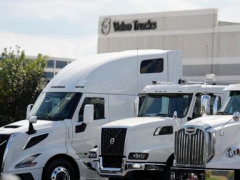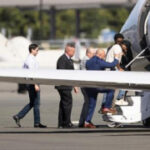WASHINGTON — Naturepedic, a mattress and furniture company based outside Cleveland, has been planning to introduce an upscale upholstered headboard late this year or early in 2026.
But President Donald Trump has thrown those plans into disarray. On Thursday night, the president announced on social media that he was slapping a 30% tax on imported upholstered furniture. Naturepedic ships its headboards in from India and Vietnam.
So what is the company to do?
“Do we continue forth … and hope for the best?’’ asked Arin Schultz, Naturepedic’s chief growth officer. “Or do we feel like we’re priced out and drop it altogether?’’ And if Naturepedic decides to continue with the rollout, “do we eat the cost or pass it on’’ to customers?
Across the United States, lots of executives were asking themselves similar questions as they came to work Friday morning.
Upholstered furniture, after all, wasn’t the only import in Trump’s crosshairs Thursday night. In addition, the president posted on his Truth Social platform, he’s plastering import taxes – tariffs – of 100% on pharmaceutical drugs, 50% on kitchen cabinets and bathroom vanities and 25% on heavy trucks.
And he’s not waiting around to do it. The tariffs, he said, would take effect Wednesday.
Trump also raised eyebrows by justifying the levy on vanities and sofas as necessary for national security. “It’s hard to see how a kitchen cabinet industry is essential to winning the next war,’’ said Mary Lovely, senior fellow at the Peterson Institute for International Economics.
Thursday’s social media barrage was j ust the latest in Trump’s push to upend American trade policy, which for decades pushed for lower trade barriers around the world.
In place of an open market, Trump has built a tariff wall around the U.S. economy, slapping double-digit taxes on imports from almost every country on earth and targeting products (steel, aluminum, autos) with specific taxes of their own.
Trump says the tariffs will protect U.S. industries from foreign competition, encourage companies to bring production to the United States and raise money for the U.S. Treasury.
They certainly have become a moneymaker for the federal government. Since fiscal year 2025 began last Oct. 1, the U.S. Treasury has collected $172 billion in customs duties, up by $96 billion (or 126%) from the same period in fiscal 2024. Still, tariffs account for less than 4% of federal revenue.
Businesses, lawyers and trade analysts are still wondering what to make of Trump’s Thursday night tariffs. “We’ve only seen the President’s Truth Social posts,” said Dan McCarthy, principal in McCarthy Consulting and a former official with the Office of the U.S. Trade Representative in the Biden administration. “We need to see the details.’’
For example, Naturepedic isn’t sure whether the 30% levy on upholstered furniture will be stacked atop a separate and earlier 50% tariff on goods from India.
Here’s what we know so far:
The president has been threatening tariffs of 200% or more on pharmaceuticals. “It’s to force Big Phar





